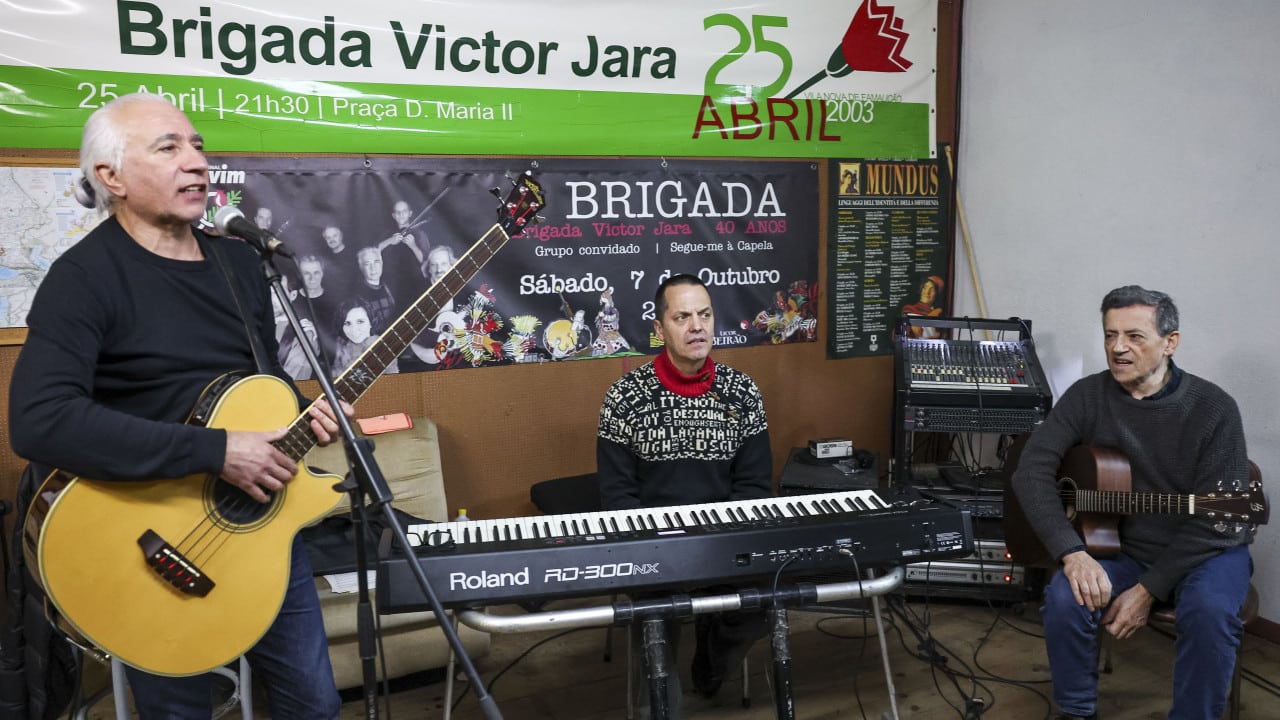The Victor Jara Brigade, which was born in Lousã in 1975, assumes the legacy of April 25 in the area of traditional music as a commitment to the future of democracy.
The group, now a cultural cooperative based in Coimbra, had its origins in the Revolutionary Process in Progress (PREC), when students took part in the opening of a road as part of the Armed Forces Movement’s (MFA) cultural dynamization and civic action campaigns.
It began as an informal group, made up mainly of young people linked to the Union of Communist Students (UEC).
“We have an obviously political position in the cultural field. We can’t think of music in isolation from the world,” Manuel Rocha, one of the Brigada’s oldest members, told Lusa.
Proud to have “roots in the spirit of freedom”, the group has the ideals of April “in every one of its words”, emphasized the violinist, who studied music in the former Soviet Union in the 1980s.
The Victor Jara Brigade began touring Portugal in 1975, bringing revolutionary songs from Portugal and other countries to the public, and then concentrated on researching and disseminating traditional Portuguese music, starting with the release of their first LP, “Eito Fora”, in 1977.
“We think it’s worth not giving up all our weapons to what is the predominant Anglo-Saxon noise of our time,” he explained.
The musician stressed the importance of maintaining this course 50 years after the Carnation Revolution, “the time of the literacy and health education brigades, when the brigades of students from the University of Coimbra went to the countryside to do theater” and socialize with the people.
“Popular roots music was hidden in the collections of a few ethnomusicologists, whose main reference was always Michel Giacometti,” he recalled, also highlighting the support of Louzã Henriques and the Ethnography and Folklore Group of the Coimbra Academy (GEFAC), “when real and metaphorical roads were opened up.”
A psychiatrist by profession and an ethnologist by devotion, Manuel Louzã Henriques “was a man who was very close to all the things that happened in our land,” said the music teacher.
“And he even showed us the ‘fado corrido’ that we recorded later [LP “Quem Sai Aos Seus”, 1981], somehow as a tribute to him and his people from Serra da Lousã,” he explained.
For Manuel Rocha, in essence, in almost half a century of activity, the Brigade has adopted “a traditional repertoire, from which it has built a distinctive sound object” that has “an intention and a commitment” to democracy.
Catarina Moura has been part of the project since 2000. “I’ve held on and that’s a good sign,” rejoiced the only woman in the collective, which was born in 1975, just like the Brigade.
“I have a lot of affection for my comrades on the road,” the singer, who is involved in other cultural initiatives locally, told Lusa.
Multi-instrumentalist Ricardo Grácio, 38, is the youngest member of the group. He fulfilled a dream by joining his “favorite band” of all time.
“I’m part of the last ‘revolutionary brigade’ still active,” he joked, having been Manuel Rocha’s pupil at the Coimbra Conservatory of Music as a boy.
Arnaldo Carvalho, meanwhile, has “a very long memory of this path”, dating back to 1978. “We work as a real collective and this is one of the secrets of our longevity,” he said.
Over the course of 49 years, with different line-ups, the Victor Jara Brigade recorded 10 albums: “Eito Fora” (1977), “Tamborileiro” (1979), “Quem Sai aos Seus” (1981), “Marcha dos Foliões” (1982), “Contraluz” (1984), “Monte Formoso” (1979), “Danças e Folias” (1995), “Por Sendas Montes e Vales” (2000), “Ceia Louca” (single, 2003) and “Ceia Louca” (CD, 2006), collected in the compilation “Ó Brigada” (2015).









